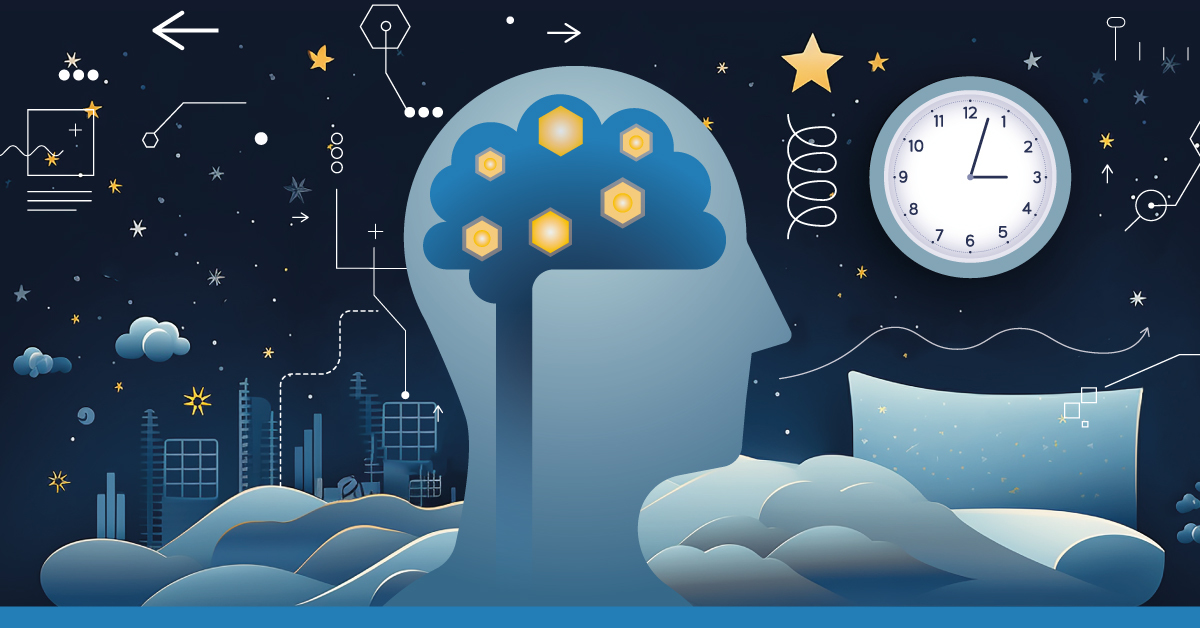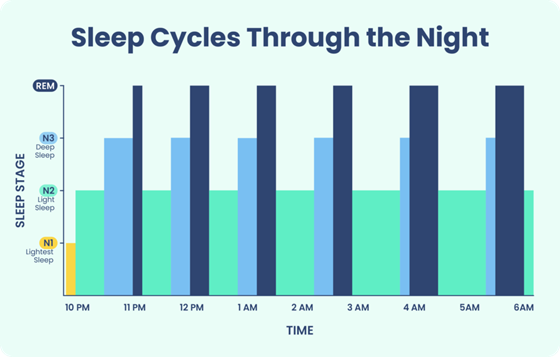Sleep 101: What actually happens to me when I sleep?

In peace I will both lie down and sleep; for you alone, O Lord, make me dwell in safety. Psalm 4:8
Have you ever felt like you woke up “on the wrong side of the bed” or right as the alarm was going off, you felt like you had just fallen asleep? On the flipside, how much more accomplished do you feel on a day when you’ve “slept like a baby?” Ever wonder why?
According to Dr. Matthew Walker, Scientific Advisor of the Sleep Foundation, “Sleep is the SINGLE MOST EFFECTIVE thing you can do to reset the health of your brain and body.” Sleep allows the body and brain to recover during the night. Lack of sleep not only makes us feel more tired but can also increase your risk for many diseases and health problems, including obesity, heart disease, high blood pressure, diabetes and stroke. People who get enough sleep most of the time, also get sick less often, tend to get along with others better, make good decisions and even avoid injuries.
Sleep is also closely connected to mental and emotional health, with links to depression, anxiety, bipolar disorder and other conditions. Getting enough sleep reduces stress, improves our mood and allows us to think more clearly and do better in school and work.
Quality vs. Quantity: Is your sleep restorative?
While seven hours of sleep per night is the general recommendation for adults, it’s also important for that time to be QUALITY sleep. As an important contributor to nearly all the systems of the body, a full, quality night’s sleep involves several cycles of set stages that each serve a purpose for our body, brain and spirit.

In Stage N1, or Non-REM1, you’ve just dozed off and started transitioning to Stage N2, which involves further slowing of activity in the brain and body. It’s much easier to be awoken during these early stages of the sleep cycle.
Stage N3 is the deepest part of non-REM sleep. In this stage, your muscles and body relax even more, and brain waves show a clear pattern of slowed activity that is markedly different from when the body is fully awake. It is believed that deep sleep plays an important role in recuperation of the body as well as effective thinking and memory. Experts believe that this stage is critical to restorative sleep, allowing for bodily recovery and growth. It may also bolster the immune system and other key bodily processes. Even though brain activity is reduced, there is evidence that deep sleep contributes to insightful thinking.
Stage 4 is the only stage of REM (Rapid Eye Movement) sleep. During this time, brain activity picks up significantly, and most of the body — except the eyes and breathing muscles — experience temporary paralysis. Although dreams can happen during any stage, the most intense dreaming takes place during REM sleep. This stage is believed to be essential for the brain, enabling key cognitive functions like memory, learning and creativity. As the night goes on, it’s normal to spend a greater percentage of time in REM sleep with most of it occurring in the second half of the night.
Spending some time cycling through all the sleep stages is important because they allow the brain and body to recuperate and develop. Failure to obtain enough of both deep sleep and REM sleep may explain some of the profound consequences of insufficient sleep on thinking, emotions, and physical health. Sleepers who are frequently awoken during earlier stages, such as people with sleep apnea, may struggle to properly cycle into these deeper sleep stages. People with insomnia may not get enough total sleep to accumulate the needed time in each stage. It’s vitally important to discuss your sleep patterns with your provider and work towards a solution that best fits your needs to achieving more restorative sleep.
If you’re having trouble falling asleep, here’s a few possibilities why:
- Stress or anxiety.
- Pain.
- Certain health conditions, like heartburn or asthma.
- Some medicines.
- Caffeine.
- Alcohol.
- Untreated sleep disorders, like sleep apnea or insomnia.
Improve your sleep habits with these simple recommendations from Sleep Foundation
During the day:
- Get natural light for 30 minutes or more, early in the day.
- Exercise for 20 minutes a day to fall asleep easier at night.
- Stop drinking caffeine after 2 p.m. to reduce its effects on sleep.
- Don’t eat heavy meals at least 2-3 hours before bed.
Before Bed:
- Minimize screen time 1-2 hours before bed.
- Budget time to get at least 7 hours of sleep.
- Avoid alcohol at least 1 hour before bed.
- Optimize your room to be cool, dark and quiet.
- Create a relaxing routine – move away from stressors or distractions, put on comfortable clothes, take care of oral hygiene and final bathroom needs, then read a book and/or listen to soothing music or an audio devotional, or even journal to help calm your mind for peaceful rest.
You may also find these resources helpful:
Wondr Webinar Aug. 2: “Sleep + Stress.” Watch On-demand here
Vitality Webinar through Aug. 18: “Habits for a good night’s sleep”
Log in to powerofvitality.com and click Resources > Health Resources > Health FYI Webcasts.
Have you ever told yourself “I’m just going to rest my eyes…” then accidently wake up three hours later, still tired?
Believe it or not, there are right and wrong ways to nap. The right ways provide a quick rest that results in a productive day. The wrong ways leave you tired and groggy.
According to The Sleep Foundation, the best length of naps for adults is between 20-30 minutes. During this short rest time you do not enter a deep rest state, so this quick break can leave you feeling rested, but not groggy.
Some tips for limiting your nap time to have the best results are: (could we make this a graphic?)
- Set an alarm.
- Find a comfortable nap space.
- Turn off the lights or close the blinds.
- Allow yourself to truly rest – don’t use your phone or think about work!
Naps can be what gets us through the day. If you have enough time to rest, rest wisely in order to benefit from napping!
Sources: